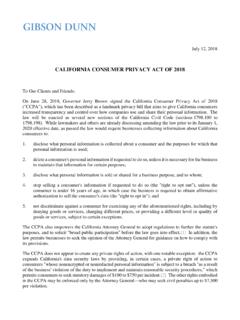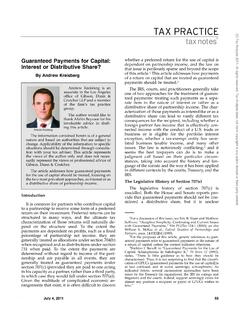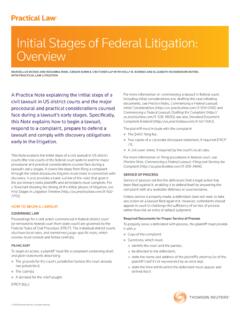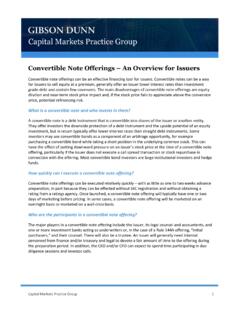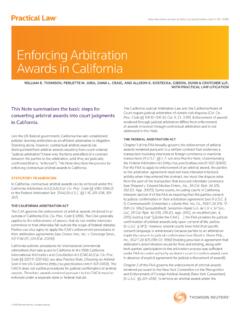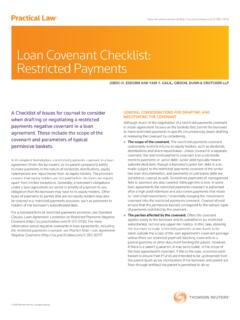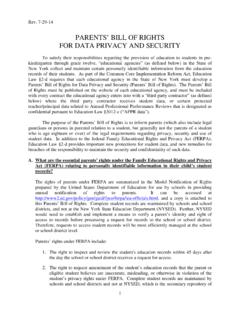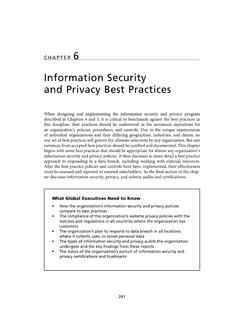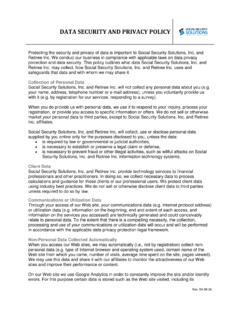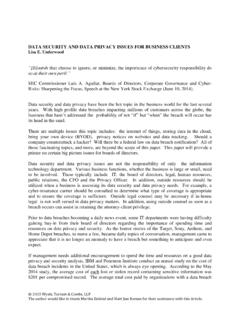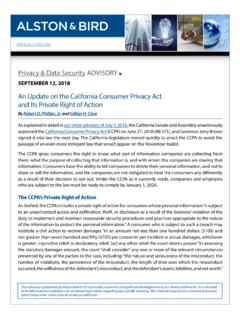Transcription of U.S. Cybersecurity and Data Privacy Outlook and Review – 2018
1 January 25, 2018 Cybersecurity AND data Privacy Outlook AND Review 2018 To Our Clients and Friends: In honor of data Privacy Day an international effort to raise awareness and promote Privacy and data protection best practices we offer this sixth edition of Gibson Dunn's Cybersecurity and data Privacy Outlook and Review . In 2017, companies were again challenged to navigate a constantly evolving landscape of Cybersecurity and Privacy issues. Last year revealed some of the largest data breaches in history, saw a new administration's shift in priorities regarding Cybersecurity , and exposed new challenges posed by increasingly "smart" and connected devices. Among other key regulatory developments this year, the Trump administration issued an executive order addressing the Cybersecurity of federal networks and critical infrastructure. The Securities and Exchange Commission ("SEC") announced a new Cyber Unit focused on targeting cyber-related misconduct and pursued cases involving novel cyber issues, including insider trading in the wake of a data breach.
2 The Federal Trade Commission ("FTC") remained active in the Privacy and Cybersecurity space, but indicated a shift of focus to cases involving "substantial consumer injury." The Department of Health and Human Services ("HHS") continued enforcement of regulations under the Health Insurance Portability and Accountability Act of 1996 ("HIPAA"), announcing several notable settlements. The Federal Communication Commission's ("FCC") role in Privacy enforcement was substantially adjusted following the repeal of Privacy rules put in place in 2016. And state attorneys general were active at the forefront of concerted efforts to bring enforcement actions and develop Privacy and Cybersecurity regulations. Indicative of this collaboration, 2017 saw the largest state data breach settlement in history. Last year also saw frequent data breaches of varying magnitudes. Throughout the year, hackers targeted government agencies and companies in every industry, seeking personally identifiable information ("PII"), customer login information, payment information, and health care information, among others.
3 As litigation especially class action litigation quickly followed many of the announced breaches, courts continued to grapple with standing issues in the wake of Spokeo, Inc. v. Robins. New class actions related to connected devices, such as TVs and cars, were also filed in 2017, and 2018 will likely see developments in this arena as more courts begin assessing standing in the context of the Internet of Things. Overlapping international Privacy frameworks also posed significant challenges for companies in 2017. With the quickly approaching May 2018 deadline for compliance with Europe's General data Protection Regulation ("GDPR"), companies worked to put in place appropriate policies and other safeguards. Last year also saw many other countries impose new or updated Cybersecurity and data Privacy regulations. 2 We cover these topics and many more in this year's Review : (I) regulation of Privacy and data security ; (II) civil litigation; (III) international regulation of Privacy and data security ; and (IV) government data collection and device unlocking.
4 For additional coverage of international developments, please see our separate International Cybersecurity and data Privacy Outlook and Review . Table of Contents _____ I. Regulation of Privacy and data security A. Enforcement and Guidance 1. Federal Trade Commission ("FTC") 2. Department of Health and Human Services ("HHS") 3. Securities and Exchange Commission ("SEC") 4. Federal Communications Commission ("FCC") 5. Consumer Financial Protection Bureau ("CFPB") 6. State Attorneys General 7. New York Department of Financial Services ("NYDFS") 8. Trump Administration Actions B. Legislative Developments 1. Federal Developments 2. State Developments II. Civil Litigation A. Standing After Spokeo 1. Background 2. Post-Spokeo Standing Decisions in Privacy Cases 3. Looking Ahead B. data Breach Litigation 1. Litigation 2. Settlement Trends 3. Shareholder Derivative Suits C. Interceptions and Eavesdropping 1.
5 Email Scanning 2. Call Recording 3. Other "Interceptions" 3 D. Telephone Consumer Protection Act E. Video Privacy Protection Act F. California's Song-Beverly Credit Card Act and Point-of-Service data Collection G. Biometric Information Privacy Acts H. Internet of Things and Device Hacking 1. Connected and Autonomous Vehicles 2. Routers, Cloud Storage, and Connected Cameras 3. Smart TVs 4. Smart Toys 5. Regulatory Guidance I. Civil Litigation: Cybersecurity Insurance 1. State of the Market 2. State of the Law Key Cases J. Fair Credit Reporting Act III. Government data Collection A. Challenge to Government "Gag Orders" B. Carpenter v. United States and the Collection of Cell Phone data C. Electronic Communications Privacy Act Reform Efforts D. Device Unlocking E. Extraterritoriality of Subpoenas and Warrants F. Collection of Records from Third-Party Cloud Providers G. Foreign Intelligence Surveillance Act Section 702 IV.
6 International Regulation of Privacy and data security A. The European Union 1. General data Protection Regulation ("GDPR") 2. Privacy Shield B. China and Other International Developments V. Conclusion 4 _____ I. Regulation of Privacy and data security Companies doing business in (and with) the United States continue to face a morass when it comes to government regulation of Privacy and data security due to the competing and overlapping efforts of myriad federal and state government regulators in this space. Nearly every major federal agency has now weighed in on data security issues in one form or another, as have most states. Below, we cover the most notable enforcement efforts, regulatory guidance, and legislative developments from the past year. A. Enforcement and Guidance 1. Federal Trade Commission ("FTC") In 2017, the FTC remained one of the most active and far-reaching government agencies regulating Privacy and data security .
7 All told, the FTC announced 12 enforcement actions related to Privacy and data security issues, while also making headlines with its related public statements and guidance. We address the most notable enforcement actions and guidance from the FTC below. a. data security and Privacy Enforcement Equifax . In September 2017, the FTC announced it had begun investigating the massive data breach at Equifax Inc., the Atlanta-based consumer credit bureau. [1] The week before the announcement, Equifax revealed that in May, hackers had exploited a flaw in the company's website that allowed them to access the account information of up to 143 million customers, including driver's license numbers, addresses, birthdates, and Social security numbers. This breach represented one of the largest in recent memory and, given the centrality of credit-reporting agencies to activity throughout the economy and the sensitive nature of the information involved, sparked renewed public scrutiny of data security issues.
8 The FTC did not elaborate on the scope of its investigation, but the announcement itself was significant given that the Commission rarely comments on ongoing investigations. TaxSlayer . Further underscoring the FTC's increased attention to companies that store consumer financial data , in August 2017 the Georgia-based online tax preparation service TaxSlayer, LLC, agreed to settle FTC allegations that it allowed hackers to access nearly 9,000 user accounts between October and December 2015. [2] The hackers then used this information to fraudulently obtain tax returns. The FTC alleged that TaxSlayer failed to implement adequate security measures, such as requiring strong passwords, providing a clear and conspicuous Privacy notice, or conducting risk assessments. As part of the settlement, TaxSlayer agreed to obtain biennial third-party assessments of its compliance with data Privacy regulations, but neither confirmed nor denied liability.
9 LabMD . As we highlighted in our 2016 Year-End Update , the now-defunct medical testing laboratory LabMD appealed an FTC order finding that the company failed to reasonably protect its customers' personal information from data breaches and requiring it to establish a comprehensive information 5 security program to safeguard against such breaches in the future. [3] In 2008, billing information for approximately 9,300 consumers became accessible on a peer-to-peer network, and other personal information for at least 500 consumers ended up in the hands of identity thieves. [4] The FTC's order overturned the initial ruling of its own Administrative Law Judge, which had dismissed the Commission's charges because they failed to show that the company's conduct created a probability of harm. [5] In November 2016, the Eleventh Circuit granted the company's request for a stay pending appeal of the Commission's decision, [6] and this past June the court heard oral argument in the case.
10 The Eleventh Circuit's ruling could significantly reshape the FTC's authority to regulate data Privacy harms. At issue in the oral argument was whether the FTC must show proof of actual consumer harm to bring a data security enforcement action under Section 5 of the FTC Act. LabMD argued that the FTC overstepped its enforcement authority because no consumer suffered an actual injury as a result of the company's data breach. The FTC countered that it nevertheless could exercise its enforcement authority under Section 5 because the unauthorized exposure of health care information constitutes a substantial injury under traditional principles of Privacy tort law. The panel was expected to issue a ruling in the months after the oral argument, but it has not yet done so. D-Link . In January 2017, the FTC filed suit against the network equipment manufacturer D-Link Corp. over the company's allegedly inadequate security measures in its routers and internet cameras.
